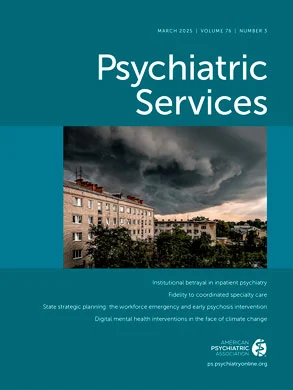Higher rates of some chronic illnesses among adults with mental illness: Adults age 18 and older who had any mental illness, serious mental illness, or a major depressive episode in the past year had increased rates of high blood pressure, asthma, diabetes, heart disease, and stroke, according to a new report by the Substance Abuse and Mental Health Services Administration (SAMHSA). For example, 22% of adults with any past-year
DSM-IV mental disorder had high blood pressure, compared with 18% of those without any mental illness. Rates of asthma were 16% and 11%, respectively, in the groups with and without mental illness. Significant differences in past-year rates of emergency department use and hospitalization were also found between those with past-year mental illness and those without. For example, 48% of adults with serious mental illness in the past year used emergency departments, compared with 31% of those without past-year serious mental illness. Hospitalization rates in the past year were 20% and 12%, respectively, for these two groups. “Behavioral health is essential to health. This is a key SAMHSA message and is underscored by this data,” said SAMHSA Administrator Pamela S. Hyde. “Promoting health and wellness for individuals, families and communities means treating behavioral health needs with the same commitment and vigor as any other physical health condition. Communities, families, and individuals cannot achieve health without addressing behavioral health.” The five-page report,
Physical Health Conditions Among Adults With Mental Illnesses, is based on SAMHSA's 2008–2009 National Survey on Drug Use and Health data and is available at
www.samhsa.gov/data/2k12/nsduh103/sr103adultsami2012.htm.
Annual costs of untreated mental illness in Kansas exceed $1 billion: The financial toll of untreated mental illness in Kansas is $1.17 billion annually, according to new research by the Health Care Foundation of Greater Kansas City. About one in ten adults in Kansas has at least one of the serious mental illnesses considered in the research: major depression, anxiety disorder, schizophrenia, and bipolar disorder, and about 40% of these adults receive no treatment. The state's spending for mental health services fell by more than $14 million—or 16.4%—between fiscal years 2009 and 2012. Only six states made steeper cuts during that period, according to the report. Researchers used national prevalence rates of the four illnesses, demographic data from the U.S. Census, and economic modeling to quantify the costs of untreated mental illnesses in Kansas, which they estimated at 177,727 cases. The costs are spread across the economy, according to the report, but the largest share is shouldered by individuals and employers. Nearly 90% of the total costs are borne indirectly by individual and employers, including lost work productivity, unrealized earnings due to unemployment, and lost income due to disability or suicide. About 10% of the costs are direct, including increased hospitalizations, outpatient and long-term care, criminal activity, Social Security disability, and welfare administration costs. The estimated costs are $522 million for individuals and families, $429 million for employers and the private sector, $111 million for the federal government, and $113 million for the state government. More information about the report is available on the Web site of the Health Care Foundation of Greater Kansas City (
hcfgkc.org), which commissioned the research.
SAMHSA manual on managing chronic pain among adults with substance use disorders: A new manual developed to equip clinicians with practical guidance and tools for treating chronic pain among adults with histories of substance use disorders has been released by SAMHSA as part of its Treatment Improvement Protocol (TIP) series. TIPs are best-practice guidelines designed to provide current information to behavioral health care professionals about effective treatment approaches. The new TIP is organized into two parts. Part 1, which is for primary care providers, addiction specialists, and other clinicians, provides a shared basic understanding of and a common language for these two chronic conditions—addiction and chronic pain—in order to facilitate cooperation and communication between professionals treating pain and those treating addiction. Part 2 is an online review (
www.kap.samhsa.gov) of the medical literature that will be updated every six months for five years. TIP 54,
Managing Chronic Pain in Adults With or in Recovery From Substance Use Disorders is available at
kap.samhsa.gov/products/manuals/tips/pdf/TIP54.pdf.Free print copies may be obtained at
kap.samhsa.gov/products/manuals/tips/numerical.htm.

